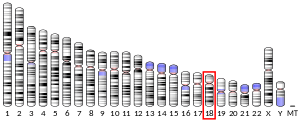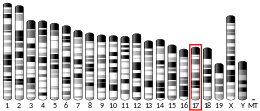TXNDC2
Thioredoxin domain-containing protein 2 is a protein that in humans is encoded by the TXNDC2 gene.[5][6][7]
References
- GRCh38: Ensembl release 89: ENSG00000168454 - Ensembl, May 2017
- GRCm38: Ensembl release 89: ENSMUSG00000050612 - Ensembl, May 2017
- "Human PubMed Reference:". National Center for Biotechnology Information, U.S. National Library of Medicine.
- "Mouse PubMed Reference:". National Center for Biotechnology Information, U.S. National Library of Medicine.
- Wiemann S, Weil B, Wellenreuther R, Gassenhuber J, Glassl S, Ansorge W, Bocher M, Blocker H, Bauersachs S, Blum H, Lauber J, Dusterhoft A, Beyer A, Kohrer K, Strack N, Mewes HW, Ottenwalder B, Obermaier B, Tampe J, Heubner D, Wambutt R, Korn B, Klein M, Poustka A (Mar 2001). "Toward a catalog of human genes and proteins: sequencing and analysis of 500 novel complete protein coding human cDNAs". Genome Res. 11 (3): 422–35. doi:10.1101/gr.GR1547R. PMC 311072. PMID 11230166.
- Miranda-Vizuete A, Ljung J, Damdimopoulos AE, Gustafsson JA, Oko R, Pelto-Huikko M, Spyrou G (Aug 2001). "Characterization of Sptrx, a novel member of the thioredoxin family specifically expressed in human spermatozoa" (PDF). J Biol Chem. 276 (34): 31567–74. doi:10.1074/jbc.M101760200. PMID 11399755.
- "Entrez Gene: TXNDC2 thioredoxin domain containing 2 (spermatozoa)".
Further reading
- Kimura K, Wakamatsu A, Suzuki Y, et al. (2006). "Diversification of transcriptional modulation: large-scale identification and characterization of putative alternative promoters of human genes". Genome Res. 16 (1): 55–65. doi:10.1101/gr.4039406. PMC 1356129. PMID 16344560.
- Gerhard DS, Wagner L, Feingold EA, et al. (2004). "The status, quality, and expansion of the NIH full-length cDNA project: the Mammalian Gene Collection (MGC)". Genome Res. 14 (10B): 2121–7. doi:10.1101/gr.2596504. PMC 528928. PMID 15489334.
- Ota T, Suzuki Y, Nishikawa T, et al. (2004). "Complete sequencing and characterization of 21,243 full-length human cDNAs". Nat. Genet. 36 (1): 40–5. doi:10.1038/ng1285. PMID 14702039.
- Strausberg RL, Feingold EA, Grouse LH, et al. (2003). "Generation and initial analysis of more than 15,000 full-length human and mouse cDNA sequences". Proc. Natl. Acad. Sci. U.S.A. 99 (26): 16899–903. doi:10.1073/pnas.242603899. PMC 139241. PMID 12477932.
- Jiménez A, Johansson C, Ljung J, et al. (2002). "Human spermatid-specific thioredoxin-1 (Sptrx-1) is a two-domain protein with oxidizing activity". FEBS Lett. 530 (1–3): 79–84. doi:10.1016/S0014-5793(02)03417-8. hdl:10261/47334. PMID 12387870.
- Sadek CM, Damdimopoulos AE, Pelto-Huikko M, et al. (2002). "Sptrx-2, a fusion protein composed of one thioredoxin and three tandemly repeated NDP-kinase domains is expressed in human testis germ cells". Genes Cells. 6 (12): 1077–90. doi:10.1046/j.1365-2443.2001.00484.x. hdl:10261/47418. PMID 11737268.
This article is issued from Wikipedia. The text is licensed under Creative Commons - Attribution - Sharealike. Additional terms may apply for the media files.



